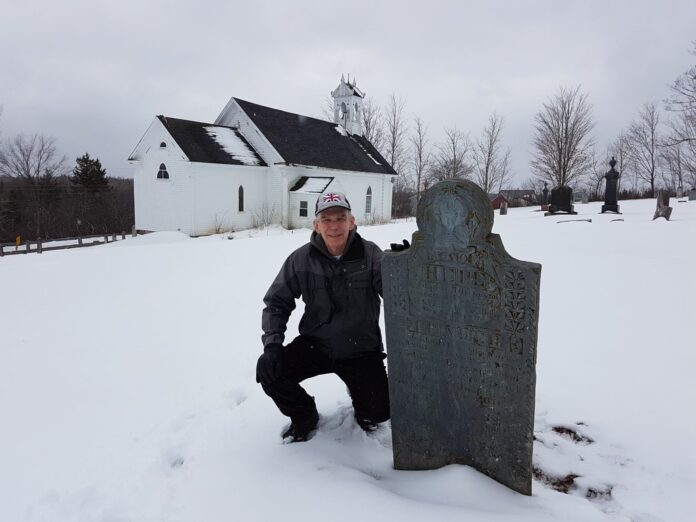When Brian McConnell retired from his career as a lawyer three years ago, he didn’t have to worry about finding a project for his downtime — he already had one. For the last ten years, he’s been a student of history, contributing to the research of Loyalists in the Maritimes.
“It’s not particularly Loyalists that interest me,” he said. “It’s more the story [of] the individual and the life experience of them.”
These are the stories of people who had resided in old American colonies and provided a service of loyalty to the British Crown and then settled in Canada after the revolution.
McConnell’s research has taken him all across the Maritimes, visiting grave sites both well established and not, scouring search records and mapping cemeteries on ‘Find a Grave’ online.
The interest in Loyalist history began when his mother found out she was related to a Loyalist originally from Albany, NY. This curiosity moved closer to home, where he realized there are limited records of Loyalists in the Maritimes, apart from the Black Loyalist Heritage Centre in Birchtown, N.S.
He has since identified 1,200 graves nationwide of Loyalists who moved to Canada. Of the 30,000 who came to the Maritimes, he has identified just over 600.
The job can be difficult, with sealed records, hard-to-find gravestones and limited upkeep of cemeteries due to lack of financing.
“There were very few resources available to them at that time and most of them wouldn’t have been able to afford to have a gravestone come in from Boston or someplace else,” he said.
At one church, despite being labeled a historic site, many of their graves had not been identified. McConnell was brought on to help preserve their history and now serves as chair of the board at Old Holy Trinity Church, which is the oldest in Nova Scotia. After requesting access to their sealed records at the archives, he found documentation from the 1780s.
In addition, he found thirty unmarked graves from Loyalist communities, with one of them being the grave of a Black man who had arrived with the Loyalists and granted freedom. He lived to be 100 years old.
Another notable finding is the diversity of the Loyalist communities, said McConnell. Some were Dutch, German, English, or Scottish, to name a few.
“They didn’t all become Loyalists for the same reason, some of them were maybe more patriotic than others, some of them might have done it for financial reasons,” he said.
“I don’t really consider too much the political aspect of it. I just identify where they are, who they were and their life story.”
McConnell shares these hidden stories on his Youtube channel, where he has been posting videos about the grave sites for over 10 years. To date, he has 339 videos and 378 subscribers.
Most of his viewers and readers connect with the genealogy aspect of his research, he said. Many show an interest when they have an ancestor located in the cemetery or church he is researching.
“The history is more interesting to me, in finding how it all pieces together and why people came to particular places.”
At this point in time, McConnell has authored 14 books, with five of them focusing on Loyalist history. He has also published various articles, including with the United Empire Loyalist’s Association of Canada.
His article writing brings him back to his days as a student reporter in his undergraduate degree at Queen’s University, where his curiosity for history and the world took flight.
“I don’t author the books or articles to try to make money,” he said. “It’s more to help provide a record and assist people that are looking themselves to get more information about that particular part of their family, [their] heritage.”
There’s no set plan for the future of his post-retirement gig. Even his next month isn’t planned, he said. Instead, when he travels or discovers something that interests someone else, his curiosity takes over.
“I come across an interesting story and I think that’s really worth sharing,” he said.

